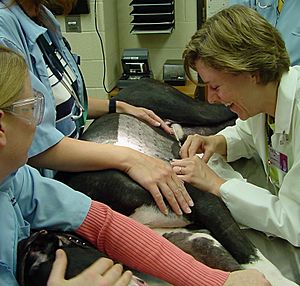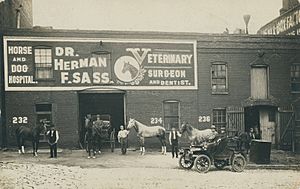Veterinarian facts for kids
A veterinarian (often called a vet) is a medical expert who works with animals. They help animals with many different health problems and injuries. Vets also play a big role in helping animals have babies, managing their health, protecting wildlife, and making sure animals are well cared for. They also focus on preventing sickness through good nutrition, vaccinations, and controlling parasites.
Contents
What Vets Do
In many countries, only people with special training and a license can call themselves a veterinarian. This makes sure that vets are highly skilled and knowledgeable. It's also against the law for someone without a license to treat sick animals or perform surgery. For example, in the United Kingdom, only registered vets can treat animals, except for a few special helpers.
Most vets work in clinics or hospitals, directly treating animals. Some vets work with all kinds of animals, while others specialize. They might focus on pets like dogs and cats, farm animals, zoo animals, or horses. Some vets even specialize in specific medical areas like surgery, skin problems, or internal medicine. Vets always make important choices about the care they provide to animals.
Where the Word "Veterinarian" Comes From
The word "veterinary" comes from the Latin word veterinae, which means "working animals." The word "veterinarian" was first used in a book in 1646. While "vet" is a common short name everywhere, in the United Kingdom and Ireland, they often say "veterinary surgeon."
A Look at History
Long ago, in ancient India, there was a wise person named Shalihotra. Many people believe he was the first to start veterinary science.
The very first veterinary college was started in Lyon, France, in 1762 by Claude Bourgelat. He saw how a serious cattle disease was harming French farms. Bourgelat decided to find a way to help. He opened his college, and students went out to fight the disease. Soon, the sickness was stopped, and the animals became healthy again. This showed how important veterinary science was for farming.
In England, the Odiham Agricultural Society was formed in 1783. This group helped make veterinary care a real profession in Britain. In 1785, they decided to "promote the study of Farriery upon rational scientific principles." Farriery was the old name for horse care.
By 1790, veterinary work became a recognized profession. This happened thanks to Granville Penn, who convinced Charles Vial de Sainbel from France to teach at the new Veterinary College in London. Later, in 1844, the Royal College of Veterinary Surgeons was officially created.
Veterinary science really grew in the late 1800s. Sir John McFadyean is often called the founder of modern veterinary research because of his important work.
What Vets Do Every Day
Vets treat animals for sickness, injuries, and other health problems. This includes figuring out what's wrong (diagnosis), giving treatment, and providing aftercare. What a vet does depends on their training and experience, but most vets perform surgeries, from simple to complex.
Unlike human doctors, vets can't ask animals how they feel. So, vets must look closely at how an animal acts and what physical signs it shows. Sometimes, pet owners can tell the vet about the animal's past health. Vets combine this information with their observations and results from tests like X-rays, CT scans, MRIs, blood tests, and urine tests.
A lot of veterinary work is about preventing problems before they start. Common things vets do include giving vaccinations for common animal diseases like distemper or rabies. They also clean teeth to prevent dental problems. Vets also teach pet owners how to keep their animals healthy and avoid future issues.
Vets also play a key role in public health. They help prevent diseases that can spread from animals to humans, called zoonoses.
Where Vets Work
Most vets work in private practices, treating animals directly. In the United States, about 75% of vets work this way.
Vets who treat small animals usually work in clinics or hospitals. Vets who treat large animals, like farm animals, often travel to farms or zoos to see their patients.
Other places vets work include animal charities, veterinary colleges, research labs, animal food companies, and medicine companies. In many countries, the government also hires vets. For example, in the United States, the Department of Agriculture employs vets.
The COVID-19 pandemic led to more people getting pets, which increased the need for veterinary services.
Different Kinds of Vets
Vets can specialize in many different areas of animal medicine:
- Exotic Animal Vet: These vets treat animals that are not common pets or farm animals. This includes reptiles, exotic birds like parrots, and small mammals like ferrets, rabbits, and chinchillas.
- Conservation Medicine: This field studies how the health of animals, humans, and the environment are connected.
- Small Animal Practice: These vets usually treat dogs, cats, and other common household pets like hamsters and gerbils. Some clinics only treat dogs or only cats.
- Laboratory Animal Practice: Some vets work in universities or labs. They are in charge of the health and care of lab animals, which can be any species. They also make sure the animals are treated kindly and ethically.
- Large Animal Practice: These vets work with farm animals like cows, pigs, and sheep, as well as horses and large reptiles.
- Equine Medicine: Some vets specialize only in horses. Horses have different bodies, how they work, diseases, medicines, and care needs compared to other animals. Vets usually specialize in horses after they finish vet school.
- Food Supply Medicine: These vets work mainly with animals raised for food, like meat, milk, and eggs. They might work with sheep, cattle, or pigs, focusing on herd health, nutrition, reproduction, and minor surgeries. Dairy vets focus on milk-producing animals. Poultry vets work with chickens and other birds, focusing on the health of whole flocks.
- Food Safety Practice: Vets work for food companies and government groups to make sure food is handled, prepared, and stored safely. This helps prevent people from getting sick from food.
- Wildlife Medicine: This is a newer area of vet medicine that focuses on wild animals. Wildlife vets might work with zoologists and conservation experts. They might also help marine animals like sea otters or dolphins after disasters like oil spills.
- Aquatic Medicine: This usually means vets who care for fish in fish farms (like salmon). It can also include caring for aquatic mammals. In countries that earn a lot from fish farming, this is a very important part of veterinary work.
- Dentistry: Many vet clinics now offer dental services. Good dental care can help animals live longer by preventing mouth diseases and keeping their teeth and gums healthy.
Images for kids
See also
 In Spanish: Medicina veterinaria para niños
In Spanish: Medicina veterinaria para niños







